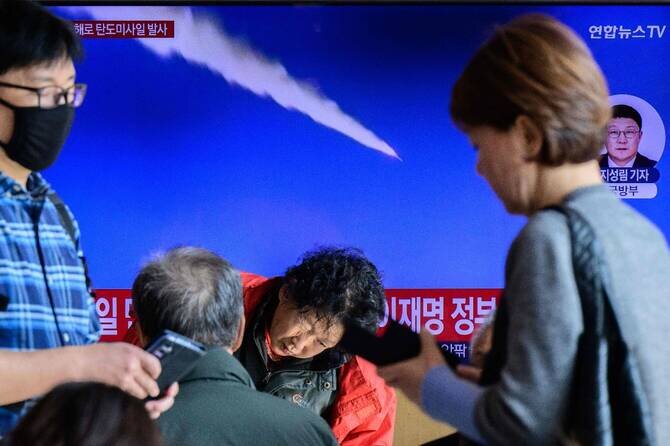
North Korea Fires Ballistic Missile Amid Tensions Over South's Nuclear Plans
North Korea launches unidentified ballistic missile towards East Sea, escalating nuclear tensions with South Korea and global powers.
South Korea’s Joint Chiefs of Staff reported that North Korea fired an unidentified ballistic missile toward the East Sea on Friday, also known as the Sea of Japan.
This launch follows closely after US President Donald Trump's approval for South Korea to build a nuclear-powered submarine.
Analysts suggest that this move by Seoul would likely provoke a response from Pyongyang.
The missile was launched at approximately 12:35 p.m. (0335 GMT) from an area north of Pyongyang and traveled around 700 kilometers before landing in the East Sea.
Japanese Prime Minister Sanae Takaichi confirmed that the missile did not cause any damage or injuries within Japan's economic waters.
The Kremlin defended North Korea’s latest launch, stating that Pyongyang has a legitimate right to ensure its security through such measures.
In contrast, Tokyo deemed North Korea’s ballistic missile launches 'absolutely unforgivable.' South Korean Defense Minister Shinjiro Koizumi indicated that the country may need to accelerate efforts to revamp its defense capabilities in response.
This recent increase in missile testing by North Korea is seen as an effort to improve precision strike capabilities and test weapons potentially intended for export to Russia.
The development of a nuclear-powered submarine by South Korea could allow them to enter North Korean waters more effectively, preemptively monitoring or intercepting weapons like submarine-launched ballistic missiles.
North Korea's leader Kim Jong Un has declared the country an 'irreversible' nuclear state following failed denuclearization talks with Trump.
In recent months, Kim has bolstered ties with China and Russia, including a military parade appearance alongside Chinese President Xi Jinping and Russian President Vladimir Putin.
These actions reflect North Korea’s increasing status in global politics.
While there have been no official meetings between the US and North Korea under current circumstances, signs suggest that Pyongyang may still be open to talks when conditions permit.
This launch follows closely after US President Donald Trump's approval for South Korea to build a nuclear-powered submarine.
Analysts suggest that this move by Seoul would likely provoke a response from Pyongyang.
The missile was launched at approximately 12:35 p.m. (0335 GMT) from an area north of Pyongyang and traveled around 700 kilometers before landing in the East Sea.
Japanese Prime Minister Sanae Takaichi confirmed that the missile did not cause any damage or injuries within Japan's economic waters.
The Kremlin defended North Korea’s latest launch, stating that Pyongyang has a legitimate right to ensure its security through such measures.
In contrast, Tokyo deemed North Korea’s ballistic missile launches 'absolutely unforgivable.' South Korean Defense Minister Shinjiro Koizumi indicated that the country may need to accelerate efforts to revamp its defense capabilities in response.
This recent increase in missile testing by North Korea is seen as an effort to improve precision strike capabilities and test weapons potentially intended for export to Russia.
The development of a nuclear-powered submarine by South Korea could allow them to enter North Korean waters more effectively, preemptively monitoring or intercepting weapons like submarine-launched ballistic missiles.
North Korea's leader Kim Jong Un has declared the country an 'irreversible' nuclear state following failed denuclearization talks with Trump.
In recent months, Kim has bolstered ties with China and Russia, including a military parade appearance alongside Chinese President Xi Jinping and Russian President Vladimir Putin.
These actions reflect North Korea’s increasing status in global politics.
While there have been no official meetings between the US and North Korea under current circumstances, signs suggest that Pyongyang may still be open to talks when conditions permit.